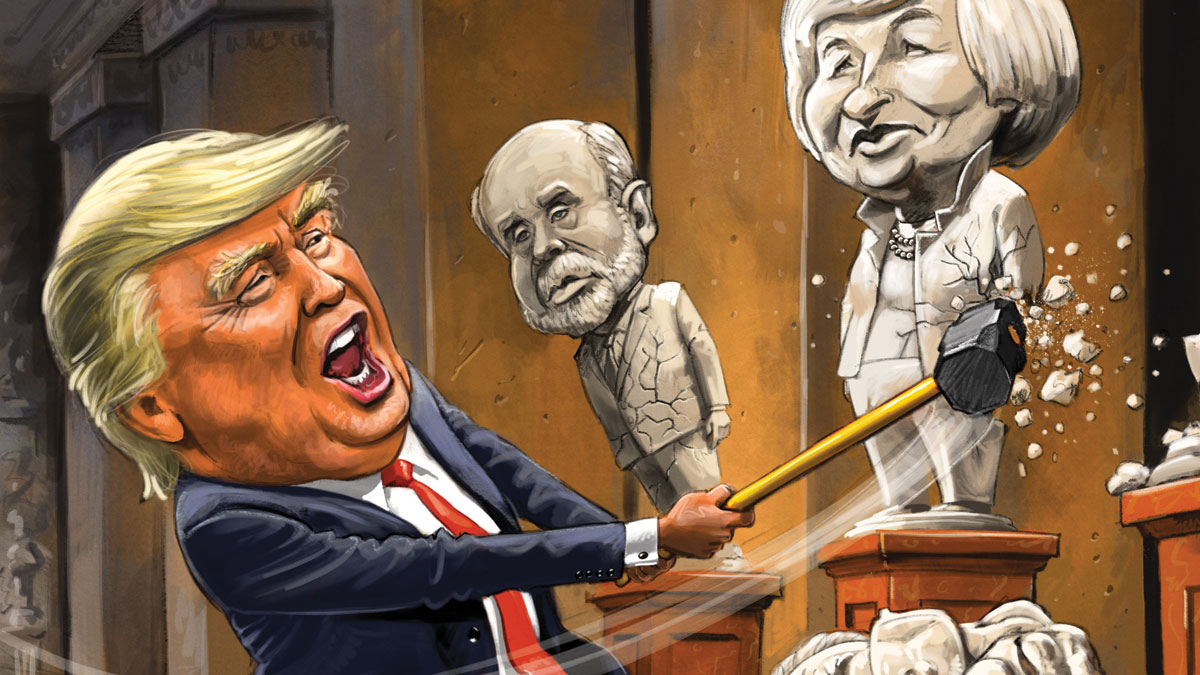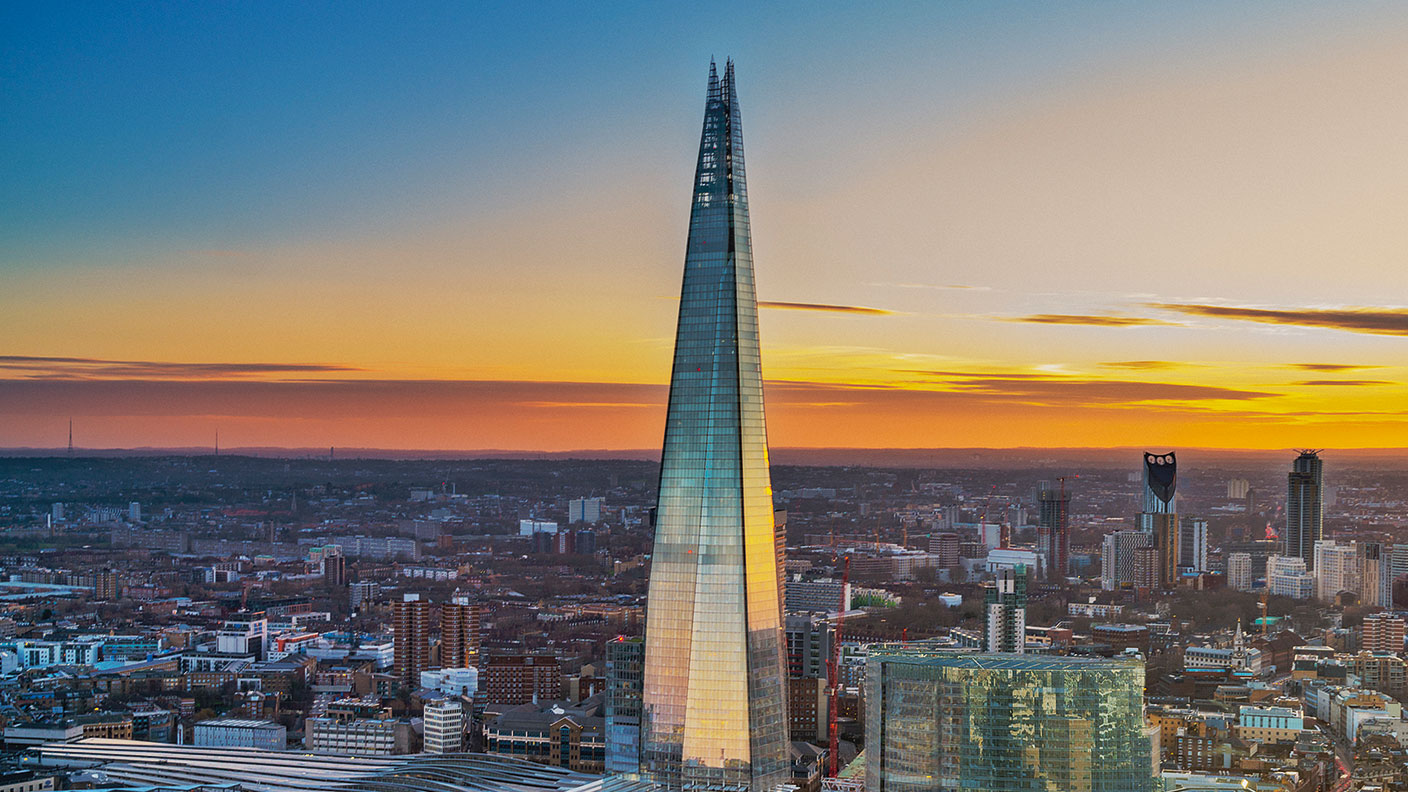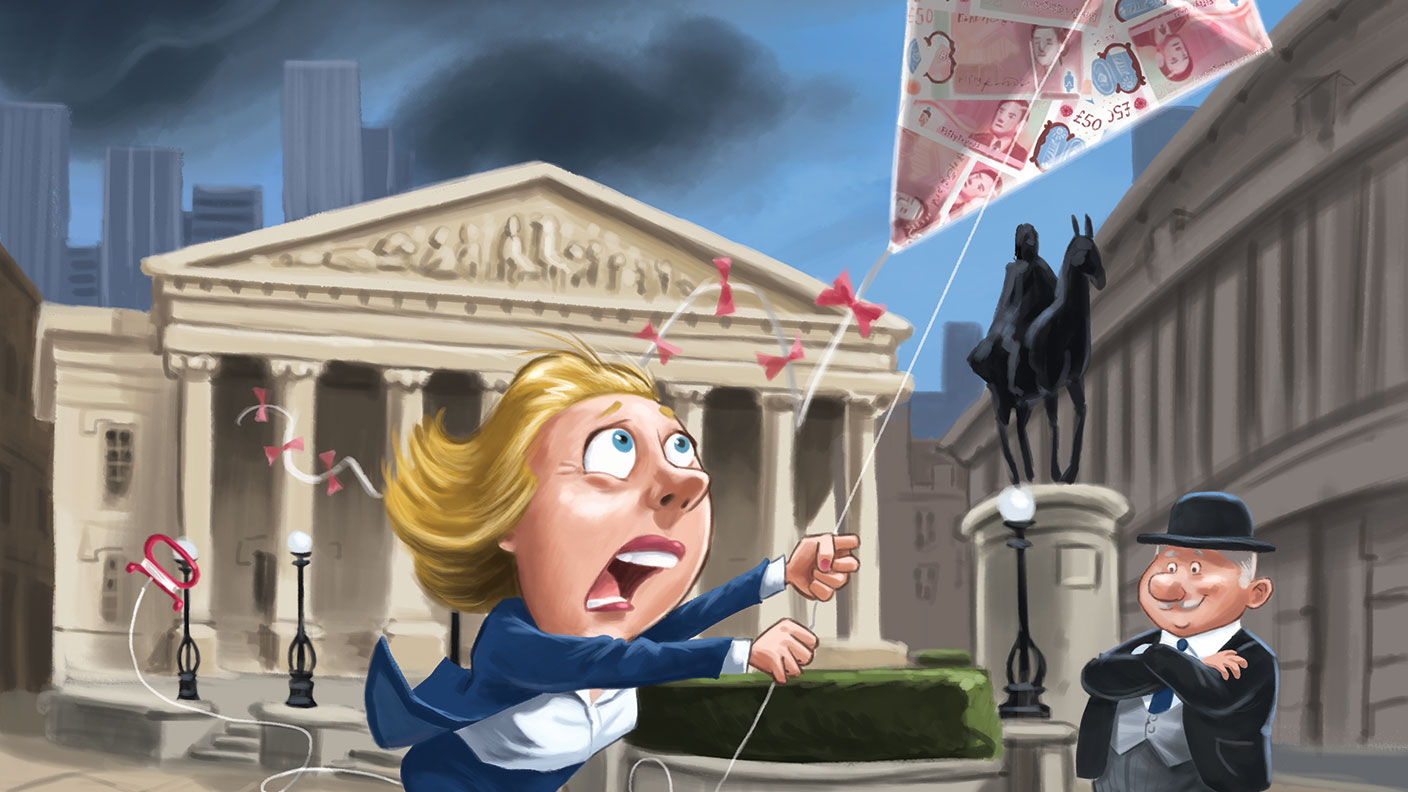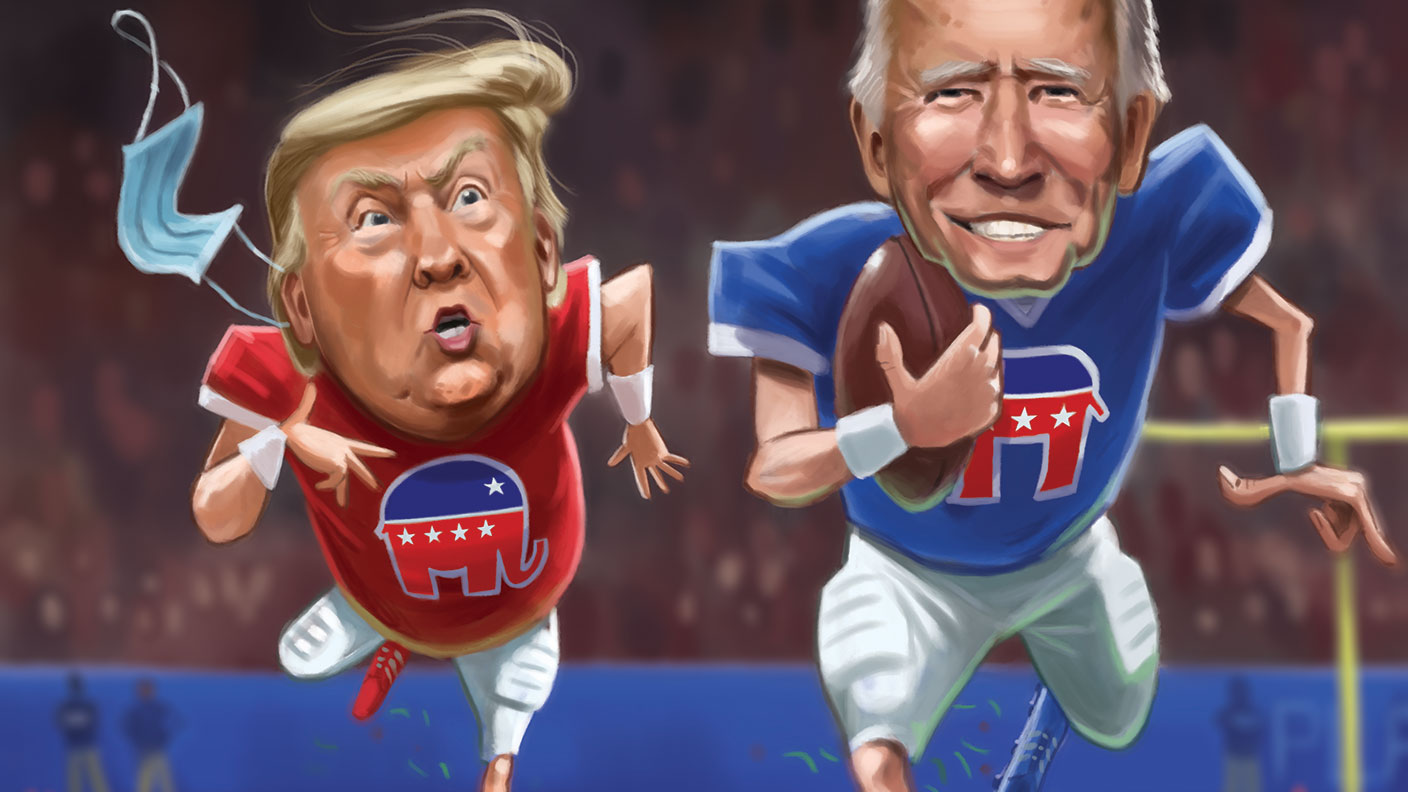What the New Year may hold in store for investors
Could 2017 finally see the collapse of Europe? Or have we already passed peak-populism? Could we see a war between the US and China? John Stepek chairs our Roundtable discussion.

Get the latest financial news, insights and expert analysis from our award-winning MoneyWeek team, to help you understand what really matters when it comes to your finances.
You are now subscribed
Your newsletter sign-up was successful
Want to add more newsletters?

Twice daily
MoneyWeek
Get the latest financial news, insights and expert analysis from our award-winning MoneyWeek team, to help you understand what really matters when it comes to your finances.

Four times a week
Look After My Bills
Sign up to our free money-saving newsletter, filled with the latest news and expert advice to help you find the best tips and deals for managing your bills. Start saving today!

Could 2017 finally see the collapse of Europe? Or have we already passed peak-populism? Could we see a war between the US and China? John Stepek chairs our Roundtable discussion.
John Stepek: What was the single most significant event of 2016 for investors?
Steve Russell: The election of Donald Trump. But Trump was just part of a shift towards populism in politics, one that started with the Brexit vote. That's important for investors because it heralds a regime change. For the last decade, central banks have been all that matters Federal Reserve boss Janet Yellen, her predecessor, Ben Bernanke, and the rest have been the global superstars of investing.
MoneyWeek
Subscribe to MoneyWeek today and get your first six magazine issues absolutely FREE

Sign up to Money Morning
Don't miss the latest investment and personal finances news, market analysis, plus money-saving tips with our free twice-daily newsletter
Don't miss the latest investment and personal finances news, market analysis, plus money-saving tips with our free twice-daily newsletter
Now politics is taking centre stage. People feel that the financial crisis has impoverished them and that things aren't getting better, and Brexit and Trump are just manifestations of this anger. That has significant ramifications for investment strategies. It doesn't so much change the path we're on, as accelerate the move towards fiscal intervention and inflation.
John: Is this the high-water mark for populism?
Steve: No, it's unlikely to stop at the UK and US. Europe is the obvious next candidate. It doesn't take someone like Marine le Pen winning an election you don't even have to change government. What matters is that even mainstream politicians like Theresa May are forced onto this populist ground and into doing fiscal intervention to pacify voters.
Paul Hodges: I absolutely agree. If you look at the latest polls, around two-thirds of voters in the major economies believe their country is going in the wrong direction. Given the upcoming elections in Europe the Netherlands, France, Germany that's very important for investors. Take Italy: 82% of Italians think the country is going in the wrong direction. That's why I think that the Italian government won't be able to hold together, and that there will be elections, probably towards the end of the first quarter.
So it's possible that in six months' time, Beppe Grillo of the Five Star Movement will be able to call a referendum on leaving the euro and he would probably win. At that point, the lira would be introduced and devalued by, say, 20% and the entire European banking system would be bankrupt.
Max King: I think that'd be quite bullish actually.
Our Roundtable panel

Paul HodgesChairman, International eChem

Max KingInvestment consultant & former fund manager

Jim LeavissHead of retail fixed interest, M&G

Dr Pippa MalmgrenFounder, DRPM Group

Steve RussellInvestment director, Ruffer
Paul: I think it'd be quite scary!
Max: If there's a banking crisis in Europe, there will be a government bail-out. That means more liquidity and money printing, which would drive asset prices up. Look at the Brexit vote. People said: "In the longer term it might be a positive, but it's very negative in the short term." But markets have a way of seeing through to the longer term much more quickly than you ever expect.
Steve: As an ardent Remainer, the best outcome in my view for the UK vis--vis Brexit is for the euro to blow up before we get to the end of the negotiation process, because we could start all over again. But I fear that Europe isn't going to blow up and the euro isn't going to collapse, certainly not fast enough to save us from the dangers of Brexit. The political will within Europe, I think, is too strong to see a rapid disintegration of what I agree is a fundamentally flawed concept. So I think it'll just muddle through.
Max: I don't think there will be any Brexit negotiation. I think Brexit means a "hard" exit and a World Trade Organisation (WTO) rules deal. I'm not saying it's the best option it's the only option, because the European Union is incapable of coming to a decision it is impossible to get 27 countries and their sub-parliaments to agree. The Canadian trade deal fiasco only got resolved at the last minute because the Europeans couldn't face the embarrassment of the deal falling apart.
Pippa Malmgren: WTO rules govern US trade with Britain and nobody complains that that's a disaster.
Paul: The chemical industry is Britain's largest manufacturing exporter. We held a Brexit briefing last month. Every single person was asked: "What is the most important thing to you?" They all said: "continued access to the single market".
Pippa: But why are they selling so much stuff to a part of the world that's not growing? They should be selling to parts of the world that are growing.
Paul: India's GDP per head is $1,500. There's nothing that we make here that they want and can afford same with China.
John: On Trump Pippa, you're a former presidential adviser. What's your take on him?
Pippa: I don't think the press has picked up on the way that Trump is dis-intermediating politics. He has shown that you can win with almost no money he spent something like $183,000 per electoral college vote, which is nothing. So everyone in Washington whose livelihood depends on political fundraising is panicking right now because they have no future.
Secondly, he's shown that you can bypass the traditional media by using YouTube and Twitter to go direct to the public. So the way that Washington works has been disrupted the people who thought that they would inevitably be chosen for certain jobs are not getting them.
My father was an economic adviser to Kennedy, Johnson, Nixon and Ford. Only Johnson ever did what Trump is doing. When Kennedy died, his people hated LBJ they viewed him as this uncouth Texan. So he had to replace them all. But he didn't have a network, so he just said to everybody: "Get me your smartest people. I don't care philosophically where they are, as long as they're loyal to the country."
That's how a lot of the so-called best and brightest came in people who normally never had a shot at getting into politics, because they weren't part of the game. It worked really well for LBJ, and it could work well for Trump.
Paul: I agree with you, but LBJ was undone by his reliance on the military and Westmoreland. Do you see the same happening with Trump?
Pippa: In the US today there's almost a civil war between the intelligence community and the more conservative defence community. The divide between left and right, and the intelligence world and the defence world, runs very deep, but usually, everybody works together regardless of who is in power. But right now they are so at odds with each other that they're practically at war.
Max: Is Trump going to cut through all that?
Pippa: No, I think he'll side with one team the conservatives and annihilate the other. Shaking up that community is not a bad thing, but it'll be messy and noisy. Meanwhile, geopolitical tensions between the US and China and Nato and Russia are far more severe than I think the market understands. I wrote a lot last year about how quantitative easing mark four is arriving in the form of defence spending, and defence spending has soared globally we're closer to conflict than the market comprehends.
John: Could we see war between the US and China?
Pippa: Modern wars are not wars in the conventional sense. They're fought in space, cyberspace and above and below the high seas, usually in non-territorial waters, so it's out of the purview of the general public. So there's already confrontation occurring in places where you can't see it. But is there any risk of an incident that becomes an issue for the markets? Definitely.
In December 2015, Chinese president Xi Jinping and Barack Obama signed a memorandum of understanding that prohibits military pilots on both sides from making obscene hand gestures at each other while flying. How close do these planes have to get to see the other guy's obscene hand gesture? My military friends tell me the answer is 20 to 40 feet. That is how close our spy planes and Chinese fighter jets have been to one another all year. So the potential for accidents is huge. And I think markets have underestimated this.
Steve: Yes, if you turn this back to investment, I agree with Pippa I don't think US defence spending is going up, but European defence spending outside of the UK is guaranteed to go up.
Pippa: It has to. And in terms of fuelling inflation, this is the most efficient form of fiscal intervention.
It has zero GDP impact and adds zero productive capacity and creates lots of jobs and wages.
John: On inflation Jim, as the resident bond expert, is the 35-year bond bull market now over?
Jim Leaviss: I do think we've seen the lows for bond yields. Central banks seem to have realised that negative interest rates are bad news for banks, so I doubt we'll see ten-year German bund yields back at negative 0.2%. But will yields return to the levels of ten, even five, years ago? That's a different matter.
We're getting carried away with this idea that Trumponomics is like Reaganomics, and that US growth will take off. But I can see a world in which Trump is unable to deliver stellar growth, or where you have political instability in the eurozone, or a slowdown in China. In that world, US bond yields could certainly go back down to 1.5% or 1%.
Paul: Actually, I think we'll see both higher interest rates and deflation. We are in this mess because two-thirds of our economy is driven by consumption. But we now have a lot more old people, because we haven't been replacing our population for 45 years now. Older people don't need to buy very much: you're not setting up a household, you're not getting married, you're not having kids and in many cases, you don't have much of a pension. So there is not a lot of pressure on demand out there.
Max: You still buy things just different things.
Paul: You buy experiences meals, holidays but you don't actually want more clutter. That's fine, but it doesn't require much manufacturing. That's a problem for Trump he wants to take us back to an era of manufacturing dominance in a world where we don't need as much stuff any more. Meanwhile, people have lost faith in central banks.
They've encouraged everyone to take on all this debt with the promise of growth but if you don't get the growth, and you don't have inflation, how do you repay the debt? That's why interest rates are going up because people are worrying about the return of their capital, not the return on their capital.
Steve: I disagree I see zero chance of getting higher rates plus deflation. But I agree we've seen the end of central-bank dominance. Central banks target nominal interest rates and, as Jim said, negative nominal rates don't work. Now the authorities are targeting negative real (after-inflation) rates. So rates might creep a bit higher, but they'll lag inflation. That's how you get rid of the debt burden.
Jim: But if you look at the US and Japan, unemployment rates are below levels that would have historically generated wage inflation. Yet we have zero wage inflation in Japan, and in the US we can't get above 2.5% to 2.75%. Why? Maybe it's because, if wages do go up, companies can just throw money at technological solutions such as driverless cars to replace human staff. So labour stays very cheap because of the threat of technology.
Steve: I'm not denying that trio of deflationary forces: the debt overhang, demographics, and "digital", for want of a better word. But the counterforce is infinite. You can create as much money as you want. You will win if you want to. So the question then becomes: does the population insist on inflation, or deflation? And with the turn to populism, they seem to be opting for inflation.
Max: There's another very good reason why the bond bear market has a lot further to run. In the last few months, billions, if not trillions, have been lost by bond investors. Yet nobody's noticed pension funds are thinking: "This is good news because our liabilities have gone down." But it isn't good news they've lost billions of pounds. It's a disaster!
Jim: People have been saying that bonds are in a bubble for 30 years now. But it's been justified by ageing populations and falling inflation. I do think bonds overall are probably expensive, but following the sell-off since mid-summer, ten-year US Treasuries are not super-expensive any more. In fact, they're probably about fair value.
Max: Trouble is, once they start going down, fair value isn't good enough. I don't think this thing will turn around until they're manifestly cheap.
John: So where should we be investing?
Our roundtable tips
Steve: The first thing for us is what not to own. That's bond proxies bond-like equities: the Johnson & Johnsons, Unilevers, etc, of this world. If we are in a bond bear market, the thing that'll stop bonds falling is the fact that at some level of yield, people will return to using bonds for income rather than blue-chip equities and that could be 3%, so it may not be that far away. As for what to buy, we like Japan. It's the best-placed market to benefit from a stronger dollar, and a Japanese central bank that is committed for now at least to keeping ten-year yields at zero.
But it's better to hedge out the impact of the falling yen so you get the full benefit of any stockmarket gains. If you're not convinced enough by the case for Japan to hedge the currency, you probably shouldn't buy it at all. As for Europe everybody hates it, and there's a lot of political uncertainty this year, but there are great companies that have survived being French for decades and they continue to be great companies and fine investments.
Paul: The chemical industry is our core competence. There's a very good correlation 85%-90% between capacity utilisation in the global chemical industry and global economic growth. Capacity utilisation across the globe has fallen almost every month this year. In the US, it's even gone negative. So we expect to see a global recession in 2017, which counts as anything below 2.5% growth. We also expect oil to fall substantially. According to the International Energy Agency, we're still sitting on the highest level of oil inventory we've ever had more than three billion barrels. So we see oil going back below $30.
Steve: I question whether a US administration would now physically allow a recession they'd be throwing money at it before it had even started.
Pippa: What I find interesting is that most of the big institutional investors I deal with sovereign wealth funds, pension funds are massively long cash. The only place they can go with that money is the real economy equities, private equity, property. They can't be in bonds because they're getting killed in there. And as the yield curve steepens a bit, the incentives to go out and deploy that cash increase.
So I'm bullish. I don't think bonds will sell off horribly either, because if the US ten-year Treasury yield rises significantly, eventually every pension fund in America would buy it, because they have to have that yield. So I think there's a lid on how far the current bond sell-off goes.
Max: I like global small cap, but especially UK small cap, which has had a poor year, but now looks attractive. The Blackrock Smaller Companies Trust (LSE: BRSC) trades on an 15% discount to net asset value (NAV). The manager, Mike Prentis, has a great track record. On oil, I don't think the price is going down.
That should be good for private equity energy specialist Riverstone Holdings (LSE: RSE). You've got a great management team adding a lot of value, and it trades at a discount to its NAV, which I think is already horrendously understated I'm pretty sure it's based on an oil price of below $40 a barrel, so the shares are far too cheap.
There are another two that I like Edinburgh Worldwide Investment Trust (LSE: EWI) is a sort of small-cap cousin to Scottish Mortgage Trust. It's done well in absolute terms, but it's not firing on all four cylinders yet I think that's to come. Finally, in emerging markets, I'd go for the Fundsmith Emerging Equities Trust (LSE: FEET). It trades at a tiny premium to NAV. Terry Smith has done a fantastic job at Fundsmith. It's been a slightly difficult few years at the emerging-market trust, but it's picked up and it's a great fund for the long term.
Jim: On bonds, we own five-year Tips inflation-protected US securities. They're pricing in 1.85% annual inflation. Given what oil's done and where we see wage inflation going, then even if it's not going to rocket, that's too low. Elsewhere in bonds, high-yield floating-rate notes look interesting you get 3%-5% plus the Fed funds rate effectively.
We saw a spike in defaults this time last year, but that was down to the energy sector. Default rates have since fallen, and so has leverage in the US high-yield market. Finally, the Japanese yen looks cheap. Everyone's expecting it to sell off forever, but on a purchasing power parity basis it should be trading at 90 yen to the dollar. Sterling looks a bit cheap too.
Paul: We see the dollar going much higher than anyone expects, and oil falling further. But my big "sell" is London houses, which are in the front line now: interest rates will go up, mortgage costs will rise, and that'll hit prices.
Max: I disagree on property. Demand exceeds supply particularly in London and the typical mortgage APR already reflects UK rates going much higher.
Pippa: I agree with Max. We're getting more inflation in emerging markets, which always destabilises them, so we're already seeing capital flight into the UK. It's not just London the amount of money going into Birmingham and Manchester is hugely underestimated by most British people.
If I had to name the most dynamic physical location in the world right now, it'd be the Mexico-Texas-Midwest corridor, mainly for manufacturing and additive manufacturing. But in second place, I'd put Birmingham North. As a manufacturer, I can see it myself. There's a reason nobody's producing in China any more it's not competitive.
John: Buy Brummie property?
Pippa: That was my view three years ago and you'd have made some serious money on that, but I think it'll go higher still.
Steve: On individual tips, I like Lloyds Banking Group (LSE: LLOY), which is just a nice, ordinary bank that should gain as interest rates start to rise. I disagree with Paul on oil, so I'll also opt for BP (LSE: BP). Oil's had its deflationary bust, and commodities and oil are always interesting in an inflationary environment. As for BP specifically, the capital constraints imposed following the Gulf of Mexico disaster meant it wasn't spending money when oil was at $100 a barrel, unlike everyone else.
Finally, there are two small companies. FDM Group (LSE: FDM) is an IT recruiter. It's a great small company quite expensive, but growing fantastically and likely to benefit from the inability of companies in the UK to import overseas IT staff. Then, in line with what Pippa said Real Estate Investors (LSE: RLE), which owns a lot of commercial property in west Birmingham.
Max: What about gold?
Steve: The danger is that for the next few months, as inflation comes in, people will fail to recognise the difference between nominal and real (after-inflation) interest rates. So index-linked bonds and gold will sell off, along with nominal bonds. We've already seen some of that since Trump's win. If any of the political concerns raised around the table are right, then you definitely want gold but for the next six months or so, as the ultimate undated zero-coupon asset, it's quite vulnerable to the Fed raising rates.
John: Thanks everyone.
Get the latest financial news, insights and expert analysis from our award-winning MoneyWeek team, to help you understand what really matters when it comes to your finances.

-
 Pension Credit: should the mixed-age couples rule be scrapped?
Pension Credit: should the mixed-age couples rule be scrapped?The mixed-age couples rule was introduced in May 2019 to reserve pension credit for older households but a charity warns it is unfair
-
 Average income tax by area: The parts of the UK paying the most tax mapped
Average income tax by area: The parts of the UK paying the most tax mappedThe UK’s total income tax bill was £240.7 billion 2022/23, but the tax burden is not spread equally around the country. We look at the towns and boroughs that have the highest average income tax bill.
-
 Governments will sink in a world drowning in debt
Governments will sink in a world drowning in debtCover Story Rising interest rates and soaring inflation will leave many governments with unsustainable debts. Get set for a wave of sovereign defaults, says Jonathan Compton.
-
 Why Australia’s luck is set to run out
Why Australia’s luck is set to run outCover Story A low-quality election campaign in Australia has produced a government with no clear strategy. That’s bad news in an increasingly difficult geopolitical environment, says Philip Pilkington
-
 Why new technology is the future of the construction industry
Why new technology is the future of the construction industryCover Story The construction industry faces many challenges. New technologies from augmented reality and digitisation to exoskeletons and robotics can help solve them. Matthew Partridge reports.
-
 UBI which was once unthinkable is being rolled out around the world. What's going on?
UBI which was once unthinkable is being rolled out around the world. What's going on?Cover Story Universal basic income, the idea that everyone should be paid a liveable income by the state, no strings attached, was once for the birds. Now it seems it’s on the brink of being rolled out, says Stuart Watkins.
-
 Inflation is here to stay: it’s time to protect your portfolio
Inflation is here to stay: it’s time to protect your portfolioCover Story Unlike in 2008, widespread money printing and government spending are pushing up prices. Central banks can’t raise interest rates because the world can’t afford it, says John Stepek. Here’s what happens next
-
 Will Biden’s stimulus package fuel global inflation – and how can you protect your wealth?
Will Biden’s stimulus package fuel global inflation – and how can you protect your wealth?Cover Story Joe Biden’s latest stimulus package threatens to fuel inflation around the globe. What should investors do?
-
 What the race for the White House means for your money
What the race for the White House means for your moneyCover Story American voters are about to decide whether Donald Trump or Joe Biden will take the oath of office on 20 January. Matthew Partridge explains how various election scenarios could affect your portfolio.
-
 What’s worse: monopoly power or government intervention?
What’s worse: monopoly power or government intervention?Cover Story Politicians of all stripes increasingly agree with Karl Marx on one point – that monopolies are an inevitable consequence of free-market capitalism, and must be broken up. Are they right? Stuart Watkins isn’t so sure.